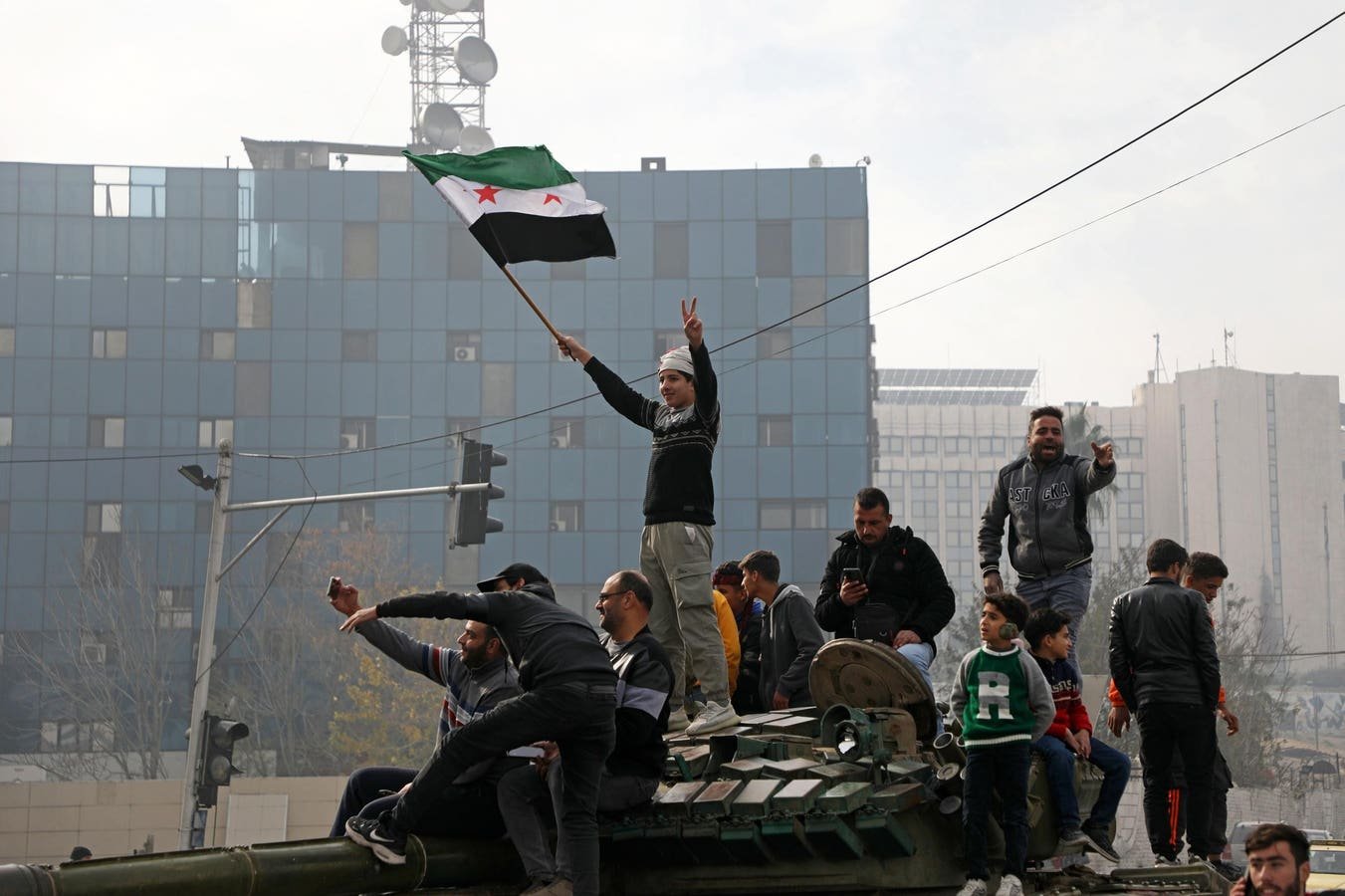DAMASCUS, SYRIA – DECEMBER 8: People react to the fall of Syrian regime in Umayyad Square on … [+] December 8, 2024 in Damascus, Syria. (Photo by Ali Haj Suleiman/Getty Images)
As the Russians inexorably gain ground by inches in Ukraine they’re losing around the world. Make no mistake, Putin is, thereby, also losing his legitimacy. This column will itemize Moscow’s far-flung axis of retreat. And we can certainly thank Ukraine’s monumental sacrifice for that. For Putin, though, the sacrifice is worth the game so long as he ends up effectively with victory in Ukraine. Because he can leverage its resources and his gained prestige for a global resurgence in a year or two.
Syria, the first substantial domino to fall, happened because of the resources Russia consumed in Ukraine, leaving little left over to defend Syria. But there is another factor, another reason why Moscow’s hold on Syria collapsed with suspicious speed. This column has, in the past, posited the scenario of a deal in which Russia is allowed to overwhelm Ukraine. In exchange, Israel takes down Iran and its proxies. Meaning Israel is even allowed to bomb Iran directly, something that American Presidents have consistently refused to green-light. That will soon change.
Evidence confirming one half of this deal has just emerged, the half in which Moscow sold out Iran and its proxies. Which shouldn’t reduce the credit accorded to Ukraine for draining Russian resources or to Israel for ruthlessly flattening Iran’s proxies. Nevertheless, it does appear that Putin stood down over Syria. A top military figure in Iran just gave a Mosque speech saying, in effect, that Russia sold out. According to a New York Times article dated January 9th, titled ‘Top Iranian General Admits Big Defeat in Syria’ general Behrouz Esbati made a number of striking revelations – including a claim that Russia had ‘deceived Iran’. It had fake-bombed the opposition offensive while bombing empty fields instead. And that previously the Russians had ‘turned off radars’ to allow Israel to bomb targets in Syria. The global media has rarely, if ever, noted such tacit agreement between the two powers. This column has done so repeatedly.
Still, the Syria collapse in tandem with the slow attrition in Ukraine, dealt severe blows to Russia’s prestige, emboldening rivals around the globe. Turkey has benefited hugely in Syria and elsewhere. The Turks have banned Russian ships from Turkish ports. And have launched proxies in Libya to attack Moscow’s proxies there under General Haftar. In Georgia’s breakaway provinces things don’t look good for Putin – Abkhazia’s pro-Russian president had to resign owing to mass anti-Russian demonstrations. Azerbaijan publicly rebuked Moscow for the recent shoot-down of the Azeri civilian airliner over Chechnya. The pro-Putin Chechen strongman Kadyrov is in disgrace for that outrage and for his publicly vocal support of suspects in attempted assassinations in Uzbekistan. Moldova’s separatist Transnistria region the pro-Putin regime is wobbling as people freeze because Ukraine shut off the pipeline from Russia. Armenia has repudiated its alliance with Moscow. Rumania’s Russia-aligned candidate for President was scotched by its Supreme Court. Across Africa, notably in Sudan, Russia’s shadow shrinks apace with the loss of Syria’s ports to relay supplies southward. Even in Ukraine, Moscow has resorted to imported mercenaries en masse as it runs out of Russian troops.
Thus far the immediate beneficiaries of this global retreat have been Israel and Turkey. Let us not forget that Erdogan is busily selling his economically besieged population the glories of a wider Turkic alliance deep into Russia’s Central Asian flank. But, for the west in particular, the bigger picture cannot be more self-evidently eloquent of a historic opportunity. Putin’s overreach in Ukraine has given the western alliance multiple chances to check the regime’s endeavors to recreate Moscow’s empire. At a time when the west’s global and regional rivals have been relentlessly expanding their influence in Europe, the Mideast and far east, circumstances keep cropping up to break that expansion – and the West keeps missing the chance.
To take one case in point, a pivotal case, Europe and the US consistently underestimated the importance of events in Tbilisi down the years. Russia’s unpunished invasion there in 2008 and successful regime change led directly to the invasions of Ukraine. Finally, Georgians have taken their destiny in their own hands by taking to the streets to oust the pro-Russian government of Bidzina Ivanishvili and we are hearing some voices in the US Congress publicly backing them. At long last. Here is a long read by a distinguished former Georgian diplomat about Moscow’s use of proxies down the decades and the latest popular pushback against it in Georgia.
Clearly for the West to start rolling back Putin’s imperial web of power and intrigue, Western leaders have to publicly consider a post-Putin Russia, even a downsized Russia. When that happens, we will know that EU/US leaders are in earnest about exploiting Syria’s events to carve a stable future. Alas, no such chatter is, as yet, audible.
